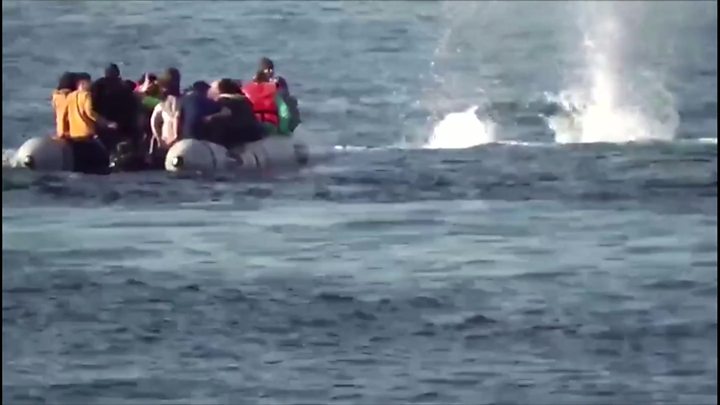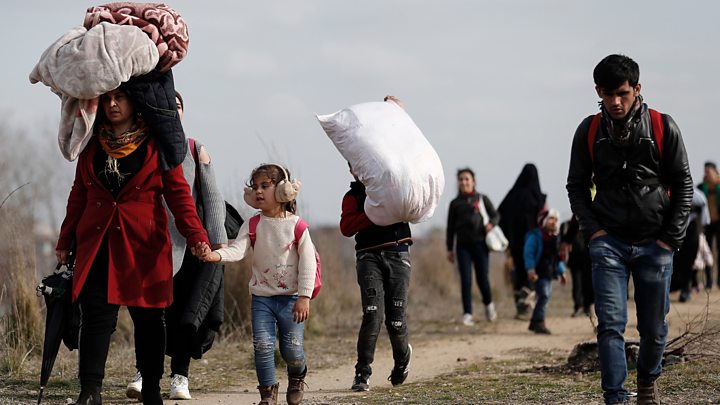Top European officials are visiting Greece's border with Turkey to assess the new crisis over refugees and migrants trying to enter the EU.
EU Commission President Ursula von der Leyen, European Council chief Charles Michel and European Parliament speaker David Sassoli arrived on Tuesday.
Prime Minister Kyriakos Mitsotakis is hoping for support for Greece's tough line on defending its borders.
Turkey lifted controls on migrants exiting for the EU on Friday.
It took the decision after suffering a heavy military loss in north-west Syria, where it has been trying to create a safe area to resettle millions of Syrian refugees it took in during the ongoing civil war.
At least 24,000 people have been stopped from crossing the border from Turkey since Saturday, according to Greek government figures.
Austrian Prime Minister Sebastian Kurz has accused Turkish President Recep Tayyip Erdogan of using the migrants as pawns. He also announced that his government had strengthened Austria's borders to make sure the mass influx of refugees and migrants of 2015 was not repeated.
EU foreign policy chief Josep Borrell is due to visit Ankara to discuss Turkey's decision to drop restrictions on migrants, abandoning a deal struck in 2016.
What was the 2016 EU-Turkey deal?
- It was proposed as a solution to the migrant crisis in which almost one million refugees and migrants arrived in the EU in 2015 and thousands died in mass drownings
- On 20 March 2016 the EU and Turkey made a deal that saw Syrian refugees who arrived on Greek islands sent back to Turkey. In return Turkey received €6bn (£5.2bn; $6.7bn) in EU aid for migrants and refugees
- For every Syrian person removed from Greece to Turkey, another would be resettled from Turkey to the EU
- The EU agreed to work towards lifting requirements for Turkish citizens by the end of June 2016
- After the deal was agreed, the number of migrants arriving in Greece declined sharply
What is the situation at the border?
Monday night was quiet in comparison with events over the weekend when thousands of migrants clashed with Greek security forces, a Greek army officer told Reuters news agency near the Kastanies border crossing.
"There were only a few attempts today [by migrants to cross the border]," he said. "Let's hope they get the message."
Some migrants including women and children could be seen in custody after being detained on the Greek side of the land border.
On the Turkish side, migrants who had been waiting around the border city of Edirne were again moving towards the frontier.
Several hundred migrants crossed to Greece from Turkey by boat in recent days but people were deterred by choppy seas on Tuesday, a police source told Reuters.

Media playback is unsupported on your device
A young boy died when a boat capsized off the Greek island of Lesbos on Monday, Greek police say. It was the first reported fatality since Turkey opened its border.
The three EU leaders arrived at the Kastanies border crossing.
Greek Prime Minister Kyriakos Mitsotakis said earlier he expected a message of support.
"Greece cannot be blackmailed in this way, and it will not be blackmailed," he told people in the town of Alexandroupolis.
"I think the fact that today we have, will have the presence of all the leadership of Europe here is support of this policy because I will never tire of reminding everyone and the Europeans that the borders of Greece are also the borders of Europe."
Mr Mitsotakis tweeted photos of himself meeting Greek security forces.
Mr Sassoli tweeted a photo of himself and his EU colleagues on their way to the border.
Why is the humanitarian crisis so grave?
Nearly a million Syrians have fled to the Syrian-Turkish border since December, amid heavy fighting in the Idlib region between Turkish-backed rebels and Syrian government forces.
Turkey is already hosting 3.7 million Syrian refugees, as well as migrants from other countries such as Afghanistan.

Media playback is unsupported on your device
President Erdogan said the EU had provided no help for resettling Syrian refugees in safe zones inside Syria and he predicted that "millions" of migrants would go to the EU.
Greece has blocked any new asylum applications for the next month, because of what it calls the "coordinated and massive nature" of illegal migration from Turkey.
But the UN Human Rights Council said Greece had no legal justification for suspending asylum procedures.
Europe's top human rights watchdog, the Council of Europe, has condemned both Turkey and Greece, calling the situation an "unprecedented humanitarian crisis".
"Everything must be done to de-escalate violence in the border region, including by ensuring that law enforcement authorities refrain from using excessive force," it said.
https://news.google.com/__i/rss/rd/articles/CBMiLmh0dHBzOi8vd3d3LmJiYy5jb20vbmV3cy93b3JsZC1ldXJvcGUtNTE3MjEzNTbSATJodHRwczovL3d3dy5iYmMuY29tL25ld3MvYW1wL3dvcmxkLWV1cm9wZS01MTcyMTM1Ng?oc=5
2020-03-03 12:24:14Z
52780628766708
Tidak ada komentar:
Posting Komentar